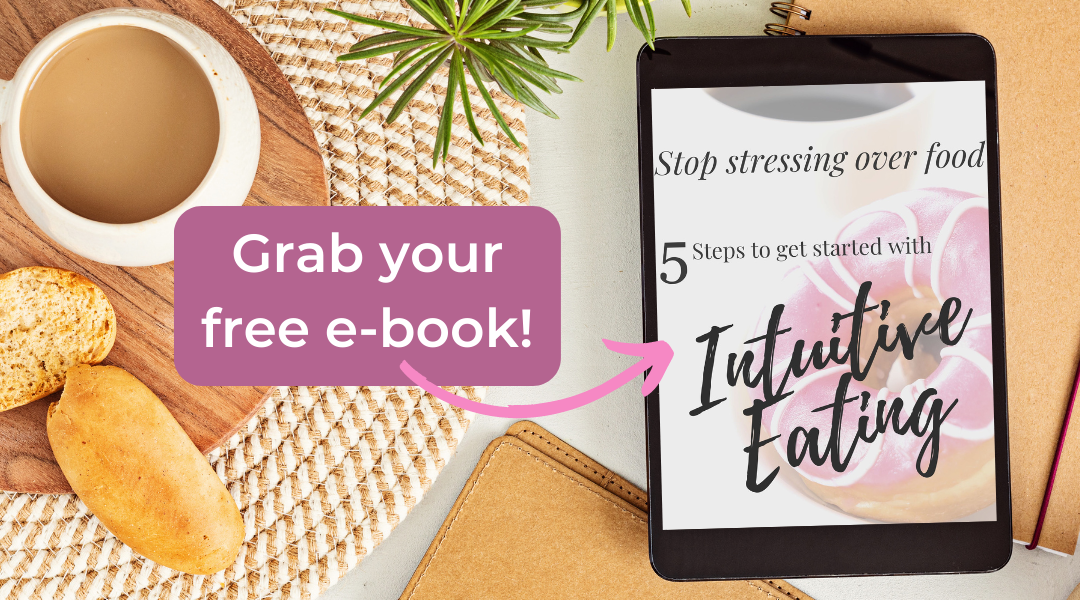Do you need a diet plan or intuitive eating?

6 signs intuitive eating may be your answer to finding food freedom.
Are you always looking up the latest food trends? Do you struggle to consistently follow your latest diet? Perhaps you experience emotional or out of control eating? Or you have spent many years trying to lose weight only to gain it all back?
If you relate to any of this, your answer to feeling good around food may be less about what you should eat and more about connecting with your own body's needs. This is how to tell if you need a diet plan or intuitive eating to finally feel good around food.
Intuitive eating vs a diet plan?
A diet plan generally gives us advice or rules on what foods to eat, how much to eat and when to eat. If you are feeling overwhelmed around food or not sure what food will make your body feel good, this can sound like a fairly simple way to stop having to think about food all the time.
Intuitive eating, on the other hand, is not about eating a particular way and does not tell you what to eat. It is a longer term approach so you can learn how to eat without a diet plan and stop feeling guilt and stress around food.
While a diet plan uses nutrition knowledge or food trends to guide eating, intuitive eating supports connecting back with your own body to guide your eating.
Which is healthier?
On the outside, a diet plan may seem healthier because it is encouraging healthier foods. But most people don’t follow a diet plan long term and end up still eating foods they consider unhealthy, often with guilt.
Intuitive eating prioritises more general health. The food we eat is only one small determinant of our health. Our relationship with food, social connection, self worth, confidence and happiness all play a huge role in our health and overall wellbeing.
While intuitive eaters may initially eat larger amounts of previously limited foods, over time intuitive eaters learn what food feels good in their body and naturally eat a wider variety of foods without stress or guilt.
Looking into the research, we see the majority of diets fail for achieving weight loss or long term healthy eating. As for intuitive eating, it takes longer to learn but is a sustainable lifelong approach that is shown to improve both physical health markers, mental health makers and overall life satisfaction.
 Food serves an important role in pleasure, connection and memories.
Food serves an important role in pleasure, connection and memories.
How does intuitive eating work?
Rather than telling you what to eat, intuitive eating teaches you how to eat.
There are no specific foods you need to eat, no specific portion sizes and no rules about when to eat.
Instead, you learn what works best for your unique body. You learn what foods satisfy your body and your mind. Your body learns that food is regularly available to satisfy hunger and begins to send comfortable fullness signals as well. Your mind learns that there are no off-limits foods so it starts to crave a larger variety of foods.
How to tell if intuitive eating is for you
Here’s some signs you may not need more food rules and would benefit from improving your relationship with food instead.
1. You feel stressed around food
Feeling stressed around food is not healthy and it doesn’t support long term healthy eating. A sign that you may benefit from an intuitive eating approach is if you appear overwhelmed around food or experience guilt and shame related to food or your body.
2. You’re always on a diet (or about to start a diet)
If you are always searching for your next diet, it is a sign you are relying on food rules in place of your own body’s appetite cues. Intuitive eating can support you to develop a connection with your body so you can trust your body’s signals as your number one guide and find satisfaction from food.
3. You’re always second guessing your food choices
If you struggle to make a decision about what food to choose, have black and white thinking towards food or often regret your food choices. This is a sign your food decisions are external and this will never feel great in your body.
4. You lose weight but gain it back
Weight cycling is not good for your health but this is often where dieting leads us. If you are often experiencing weight cycling and likely the emotional rollercoaster that goes along with it, it may be time to explore a weight neutral way of working towards healthy behaviours.
5. You feel out of control around food
If you experience out of control eating such as binge or overeating, it’s a sign you are not eating enough for your body or you are not finding satisfaction from eating. Intuitive eating can support you to properly nourish your body with satisfying foods and explore any other underlying emotional triggers.
6. You turn to food for all your emotions
There’s nothing wrong with eating for comfort and pleasure, but if it is your main source of comfort for difficult emotion or you feel out of control around food when emotional, a diet plan will backfire. Intuitive eating will help you connect back with your body’s self care and emotional needs.
How to start intuitive eating
A core component of intuitive eating is removing the guilt and shame so many of us experience around food and body. To do this, we can learn the biological reasons why we can feel in a fight with our bodies, unpack cultural ideals around food and body and prioritise looking after our here-and-now bodies.
We then open up space to connect back with our body’s intuitive signals for hunger, satisfaction and emotional needs. Only when we act on our own body’s unique needs will food feel comfortable and easy long term. Once we have developed trust with our own body we can bring in food knowledge as a supportive tool but never in place of our own body’s intuitive signals.
Start becoming an intuitive eater today! Download ‘5 steps to get started with intuitive eating e-book’
Summary
Intuitive eating empowers you to build trust and acceptance with your body which naturally guides you to eat in a way that is best for your own unique body. If you are feeling stressed around food, experience out of control eating such as emotional eating or find yourself jumping from diet to diet, intuitive eating may be a supportive option learn healthy eating behaviours through a healthy and supportive mindset around food.
Author Bio:
Written by Emma Townsin, Registered Dietitian and Certified Intuitive Eating Counsellor
Emma is the founder of Food Life Freedom and the host of the Food & Life Freedom Podcast. For personalised support to stop stressing over health and heal your relationship with food and your body, learn how you can fast track your way food and life freedom.
References
- The original Intuitive Eating Pros. Research studies. http://www.intuitiveeating.org/resources/studies/. Evelyn tribole and Elyse Resch. 2022
- Hunger et al. An evidence based rationale for adopting weight inclusive health policy. Social Issues and Policy Review. 2020 January; 14 (1); 73-107. DOI: 10.1111/sipr.12062
- Evelyn Tribole & Elyse Resch. Intuitive Eating 4th Edition. New York. st Martin’s Publishing Group; 2020. 45-54
Want 1-to 1 support?
Learn how you are supported to feel good around food.









